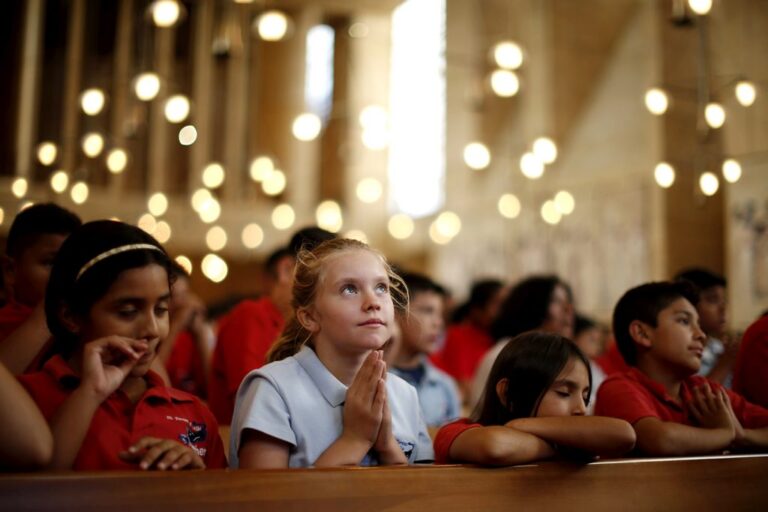The Czech Republic is a highly secular country where three-quarters of the population does not affiliate themselves with any religion and where only some 5% of the 11 million inhabitants attend religious services regularly.
In this context, the response to the synodal process offered a welcome surprise. Despite the scepticism about it among some believers and even priests, a high number of 2,312 synodal groups got involved, in which the participants learned to work together in a synodal way, to listen and to discern where the Holy Spirit was leading them.
Though the topics discussed in the groups were not always easy to talk about, we feel hope while looking back on the process so far. Some participants mentioned that for them, in the end, the official output will be less essential compared to what has already happened at their “ground level”. In their small groups, parishes or other types of communities, they became more alive and aware of their co-responsibility.
A gaze into Synod results
But it will still take some time to summarise all the diocesan syntheses into the national one. However, we can take a closer look at the diocese of Brno, which is the second biggest diocese with 557 groups involved. The outputs from the groups were analysed using both text analysis and a statistical approach. Based on the preliminary reports from other dioceses, we believe that many of the basic findings could be generalised to the whole country.
Our first finding regards the synodal reality in parishes, dioceses and the universal Church, which participants rated as rather below average. Most often they expressed a perceived lack of transparency and openness and a wish that the Church be more understandable, human, better able to accept feedback and attentive to the needs of the world.
Almost one third of the groups stressed the importance of communication between the priest and laity. They explained that it is not just theological erudition they expect from their priest, but above all, an ordinary closeness, openness, a listening attitude and the ability to work in partnership. They want to be trusted, involved in decision-making and to use their charisms.
Interestingly, in a presence of priests in synodal groups, the topic of passing on the faith and not changing the rules was more often discussed, while the reform of the Church, the celibacy of priests and the question of the ordination of women were raised in their absence.
At the same time, groups that perceived that they were already experiencing a good synodal reality in their parish were ten times more likely to say that the same is true about the diocese and four times more likely to view the universal Church in this way. The statistics, then, support the statement of the participants themselves: “As our parishes will be, so will the whole Church be.”
Welcoming Church
However, a focus on communion and relationships goes far beyond the relationship between the priest and the laity stressed the importance of brotherhood/sisterhood, concern for each other, respect and tolerance. They called for an accepting Church that would also welcome the marginalised ones and shared a concern that we “live in closed bubbles” without sufficient contact among ourselves or with the outer world.
A statistical analysis showed that this theme appeared evenly across all types of groups (regardless of age, gender, the size of the groups etc.), which demonstrates its universality. The choice of this topic may have been influenced by the synodal proposal itself; however, such a strong response also shows that this theme resonated highly with people’s feelings.
Is it possible that this response mirrors some characteristics of our time, that some scientists even call “the lonely century”? The Eastern-European countries, which include the Czech Republic, are among the ones with the highest prevalence of loneliness in Europe. However, all over the world, research shows a growing sense of loneliness, not only among people on the margins of society, but also among active and productive ones. Can this “epidemic of loneliness” also be a sign of the times we should listen to and to which we are called to search for a creative answer?
Many organisations and even whole countries have already made practical steps to address this issue as does the Church. Still, we are called to an even deeper answer, “the paschal transition from ‘I’, understood in a selfcentred way, to the ecclesial ‘we’, as suggested by the International Theological Commission in the document, Synodality in the Life and Mission of the Church (No. 107). Not an easy shift of paradigm, if we take these words really seriously!
‘I’ to ‘we’
This call for an “ecclesial we” is also overlapping with the spiritual desires expressed by more than a quarter of the groups who want to pray together more, to celebrate the holy Mass as a real Christian community and to deepen their spiritual life and relationship with God.
Thus, it is not a need that can be fulfilled on a human level only but is also a call to be together closer to God, the God, who made us as a community, in God’s own image. There is a desire to experience communion with a God who is not a cold, self-centred ‘I’, but is, as a Holy Trinity, a burning mystery of ‘We’ in its fullness. What can this teach us with regards to a profound experience of human loneliness?
Originally published by Vatican News.



